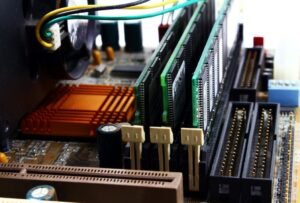Will AI Take Over Jobs?
As Artificial Intelligence (AI) continues to advance, many individuals are concerned about the impact it will have on the job market. With AI’s ability to perform complex tasks, there is a growing fear that it might take over human jobs. However, it is important to examine the situation and understand the potential implications.
Key Takeaways:
- AI has the potential to automate certain tasks in various industries.
- Human skills such as creativity, emotional intelligence, and problem-solving are difficult to replicate with AI.
- Collaboration between humans and AI is a more likely scenario than complete job replacement.
- Reskilling and upskilling can help individuals adapt to the changing job market.
*AI has the potential to automate certain tasks in various industries*, which could lead to changes in job requirements and responsibilities. However, it is important to recognize that AI is much better suited to perform repetitive tasks that require data analysis and pattern recognition, rather than tasks that rely heavily on human intuition, interpersonal skills, and critical thinking abilities.
Collaboration between humans and AI is a more likely scenario than complete job replacement. With the advantage of AI’s computational power and humans’ capability to use contextual knowledge and make informed decisions, the combination of both can result in increased productivity and efficiency. This partnership can free up human employees from mundane tasks and enable them to focus on higher-level, creative, and problem-solving activities that require human intuition and experience.
The Impact of AI on Jobs
It is crucial to understand that while AI might replace some positions, it also has the potential to create new ones. Historically, technological advancements have disrupted industries and displaced jobs, but they have also fostered the emergence of new sectors and occupations. *This pattern suggests that AI might have a similar effect, leading to a transformation in the labor market rather than complete job elimination*.
Reskilling and upskilling the workforce can play a pivotal role in mitigating the potential negative impact of AI on jobs. As certain roles become automated, individuals can focus on acquiring new skills necessary for jobs that require human expertise, creativity, and adaptability. Initiatives like lifelong learning programs and skill development schemes can ensure that individuals remain relevant and equipped to thrive in the evolving job market.
Data and Statistics
Let’s take a look at some interesting data points related to AI and job market:
| Statistics |
|---|
| The World Economic Forum predicts that by 2025, AI will generate 12% more jobs than it will displace. |
| According to a study by PwC, AI could contribute up to $15.7 trillion to the global economy by 2030. |
*AI is projected to generate 12% more jobs than it will displace*, which suggests that while there will be changes in the job market, the overall impact may not be as dire as some anticipate. The growth in AI-related jobs, as well as the potential economic benefits it brings, indicates that AI has the potential to create new opportunities and improve productivity in various sectors.
Conclusion
A thoughtful approach is necessary when analyzing the impact of AI on jobs. While it may replace certain tasks and job roles, it also has the potential to create new jobs and improve productivity. Collaboration between humans and AI is more plausible than complete job replacement. Investing in reskilling and upskilling can help individuals adapt to the evolving job market and ensure their continued employability. As technology progresses, it is crucial to embrace the potential that AI offers and anticipate the changing nature of work.

Common Misconceptions
Will AI Take Over Jobs?
With the rapid advancements in artificial intelligence (AI) technology, there have been numerous discussions and concerns about the impact it will have on the job market. However, there are several common misconceptions that people have about this topic:
- AI will replace all human jobs: While AI has the potential to automate certain tasks and functions, it is unlikely to completely replace human workers. Many jobs require complex human abilities, such as creativity, critical thinking, and emotional intelligence, which are difficult for AI to replicate.
- AI will only affect low-skilled jobs: Contrary to popular belief, AI is not only a threat to low-skilled jobs. It has the capacity to impact a wide range of professions across various industries, including white-collar jobs that involve data analysis, customer service, and even medical diagnostics.
- AI will lead to mass unemployment: Another misconception is that AI will cause widespread unemployment. While some jobs may become redundant due to automation, new job opportunities will emerge as AI technology advances. This has been evident in the past with the advent of other technologies, where new industries and job markets have arisen.
It is important to recognize and dispel these misconceptions surrounding the potential impact of AI on jobs. While it is true that AI will introduce changes in the job market, it is unlikely to completely replace human workers or lead to mass unemployment. Instead, AI will likely augment human capabilities and create new job opportunities that require collaboration with AI systems.
It is crucial for individuals and organizations to adapt to these changes by acquiring new skills, embracing lifelong learning, and finding ways to coexist and collaborate with AI technology to remain relevant in the future workforce.
- AI will augment human capabilities: AI can assist humans in performing tasks more efficiently and accurately, allowing them to focus on higher-level tasks that require human cognitive abilities and creativity.
- Reskilling and upskilling are essential: As AI technology evolves, it is crucial for individuals to continuously reskill and upskill themselves to meet the demands of the changing job market, ensuring they have the necessary skills to collaborate effectively with AI systems.
- New job opportunities will emerge: Just as technological advancements in the past have led to the creation of new industries and job markets, AI will likely create new job opportunities that we haven’t yet envisioned.

Automation Potential by Occupation
According to a report by McKinsey Global Institute, this table illustrates the percentage of jobs with high, medium, and low automation potential.
| Occupation | High Automation Potential (%) | Medium Automation Potential (%) | Low Automation Potential (%) |
|---|---|---|---|
| Cashiers | 97 | 3 | 0 |
| Receptionists | 96 | 4 | 0 |
| Fast Food Cooks | 93 | 7 | 0 |
| Bookkeeping Clerks | 87 | 13 | 0 |
| Taxi Drivers and Chauffeurs | 85 | 15 | 0 |
The Rise of Robotics
This table highlights the yearly global sales of industrial and service robots, depicting the rapid growth of the robotics industry.
| Year | Industrial Robot Sales (in thousands) | Service Robot Sales (in thousands) |
|---|---|---|
| 2010 | 160 | 6 |
| 2012 | 178 | 25 |
| 2014 | 225 | 33 |
| 2016 | 296 | 40 |
| 2018 | 422 | 62 |
AI Implementation in Healthcare
This table outlines the successful applications of artificial intelligence in the healthcare sector.
| Area of Application | AI Use Case |
|---|---|
| Diagnosis | AI algorithms assisting radiologists in detecting diseases |
| Treatment Planning | AI models recommending personalized treatment plans |
| Patient Monitoring | AI systems tracking vitals in real-time to detect anomalies |
| Drug Discovery | AI-powered algorithms analyzing vast datasets to identify potential drug candidates |
| Healthcare Administration | AI-based software automating administrative tasks and reducing paperwork |
Impact of AI on Employment
This table displays the potential impact of artificial intelligence on various job sectors.
| Job Sector | Estimated Job Losses (%) | Estimated Job Gains (%) |
|---|---|---|
| Manufacturing | 30 | 10 |
| Transportation | 20 | 15 |
| Retail | 25 | 8 |
| Finance and Insurance | 15 | 5 |
| Construction | 10 | 5 |
Factors Influencing AI Implementation
This table presents the key factors influencing the success of AI implementation in industries.
| Factors | Impact on AI Adoption |
|---|---|
| Cost-Savings Potential | High |
| Technological Complexity | Moderate |
| Workforce Acceptance | High |
| Regulatory Environment | High |
| Ethical Considerations | Moderate |
AI in Video Games
The following table shows the integration of AI in the gaming industry for creating realistic and challenging computer opponents.
| Game Title | Type of AI |
|---|---|
| FIFA 21 | Adaptive AI adjusting difficulty based on player performance |
| The Last of Us Part II | Enemy AI employing stealth tactics and adapting to player actions |
| Assassin’s Creed Valhalla | AI-driven NPCs with unique behavior patterns and situational awareness |
| Red Dead Redemption 2 | AI interacting with the player and other non-playable characters dynamically |
| Call of Duty: Warzone | AI balancing difficulty and providing challenges in gameplay |
AI in Creativity and Art
This table showcases the utilization of AI in creative fields, merging technology with artistic expression.
| Area | AI Use Case |
|---|---|
| Music Composition | AI composing original symphonies and harmonies |
| Visual Art | AI generating unique artistic patterns and designs |
| Writing | AI writing poetry, stories, and essays |
| Design | AI assisting in designing architecture and interiors |
| Fashion | AI creating new clothing designs and predicting fashion trends |
Jobs Less Likely to be Replaced by AI
This table presents diverse occupations less susceptible to AI substitution, highlighting the importance of human skills and creativity.
| Occupation | AI Vulnerability |
|---|---|
| Psychologists | Low |
| Graphic Designers | Low |
| Teachers | Low |
| Writers | Low |
| Creative Directors | Low |
AI in Online Customer Support
The table below displays the adoption of AI-powered chatbots in various industries for customer support purposes.
| Industry | AI Chatbot Integration |
|---|---|
| Banking | 72% |
| E-commerce | 81% |
| Telecommunications | 68% |
| Travel and Hospitality | 63% |
| Healthcare | 57% |
From the above tables, it is evident that AI technology and automation have the potential to drastically impact various job sectors and industries. While certain occupations face a higher risk of automation, others exhibit qualities that make them less susceptible to AI substitution. Additionally, AI’s influence extends beyond industries, finding applications in healthcare, gaming, creativity, and customer support. As we navigate this era of technological advancements, it is crucial to harness the benefits of AI while ensuring its responsible and ethical deployment.
Will AI Take Over Jobs? – Frequently Asked Questions
What is artificial intelligence (AI)?
Artificial intelligence, or AI, refers to the development of computer systems capable of performing tasks that would typically require human intelligence, such as problem-solving, decision-making, and learning. These systems aim to mimic human cognitive abilities.
How does AI affect job market?
AI has the potential to impact the job market in various ways. While it can automate certain tasks and replace some jobs, it can also create new job opportunities by augmenting human capabilities and creating new industries.
Which industries are most likely to be affected by AI?
AI has the potential to impact a wide range of industries, including manufacturing, transportation, healthcare, finance, retail, customer service, and more. Industries that heavily rely on repetitive or data-driven tasks are more likely to experience automation and job changes.
Will AI completely replace human workers?
While AI has the ability to automate certain tasks and make some job roles obsolete, it is unlikely to completely replace human workers. AI is more likely to augment human capabilities, leading to a shift in job requirements and the creation of new roles.
What are some examples of jobs that could be replaced by AI?
Jobs involving repetitive and predictable tasks, such as data entry, assembly line work, or certain customer service roles, are more susceptible to automation by AI. However, even in these cases, humans may still be needed for quality control, problem-solving, and decision-making.
What skills will be most valuable in the era of AI?
As AI becomes more prevalent, skills that complement and augment AI capabilities will become increasingly valuable. Skills such as critical thinking, creativity, complex problem-solving, emotional intelligence, and adaptability will be highly sought after.
How can individuals prepare for the impact of AI on jobs?
Individuals can prepare for the impact of AI on jobs by continuously learning and acquiring new skills that are in demand. Developing a growth mindset, staying adaptable, and focusing on skills that cannot be easily automated, such as creativity and empathy, can also help individuals navigate the changing job landscape.
What are the potential benefits of AI in the workplace?
AI can bring numerous benefits to the workplace, including increased productivity, improved efficiency, better decision-making, enhanced safety, and the automation of mundane tasks. It can free up human workers to focus on more complex and value-added activities.
Can AI create new job opportunities?
Yes, AI has the potential to create new job opportunities. As AI technology advances, new industries and roles may emerge, requiring skills such as AI development, data analysis, AI ethics, and human-AI interaction design.
Will AI make the workforce more efficient?
Yes, AI has the potential to make the workforce more efficient. By automating repetitive and time-consuming tasks, AI can help streamline processes, reduce errors, and increase overall productivity. This allows human workers to focus on more strategic and creative endeavors.




